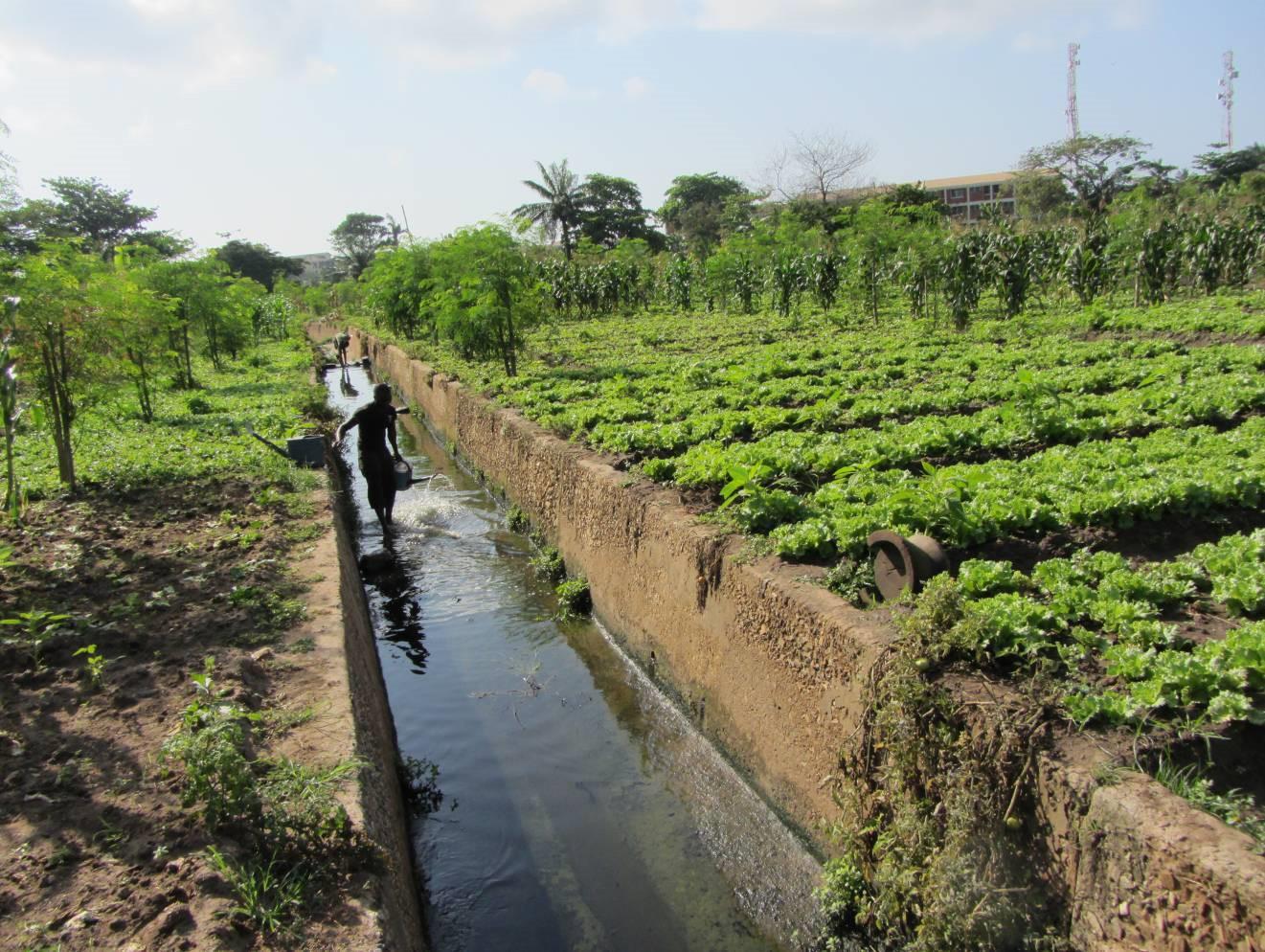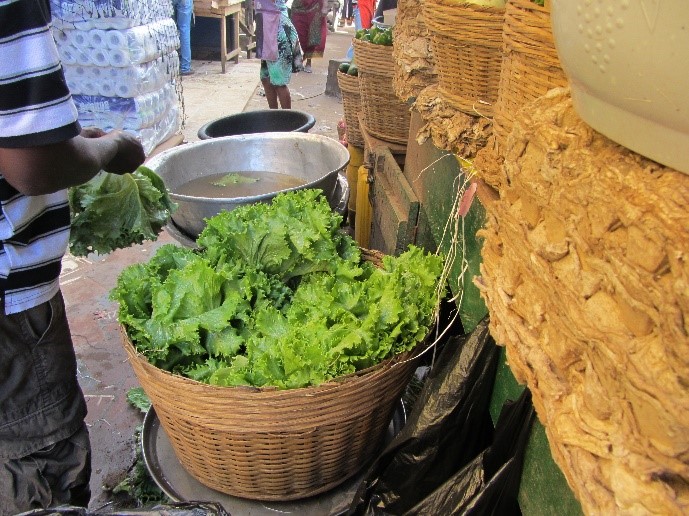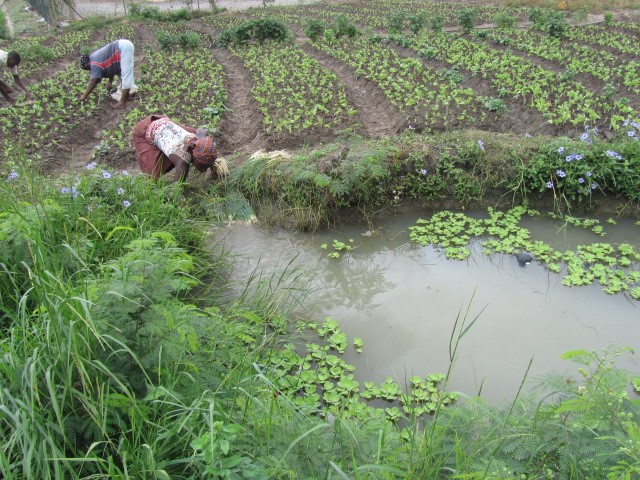Health Risks From Wastewater and Food Contamination: What Can We Do?

Credit: Prince Antwi-Agyei
This World Water Day, our former PhD student Prince Antwi-Agyei tells us about his work on wastewater use in agriculture in Ghana.
Have you ever wondered why people continue to use wastewater for vegetable farming and other purposes?
There are several reasons for this. In many contexts, farmers receive huge economic benefits due to the rich nutrients from wastewater. Other factors contributing to the increasing use of wastewater are rapid urbanisation, competition for fresh water sources, high cost of wastewater treatment, high urban food demand, and environmental sustainability.
But using wastewater also poses some health risks to consumers and farmers of irrigated produce, such as diarrhoeal diseases and helminth infections. While we know there are health risks associated with wastewater use, we are unclear about how these risks differ at different stages of the food chain. Should we be more concerned with food safety due to wastewater use at the farms, or about contamination due to post-harvest practices at markets and kitchens?

Produce washing practices at markets
The search for answers
In trying to find some answers to the above question, I conducted a study that involved interviewing about 700 farmers, vendors, chefs, and consumers on their hygiene behaviours and practices in Accra, Ghana. I also observed about 150 farmers, market vendors, and street vendors, each for 3 hours during peak hours of risk practices. I also tested 500 samples of raw produce and ready-to-eat salad and 300 soil and irrigation water for E. coli contamination.
What were the findings?
Surprisingly I found street salad to be the most contaminated (4.1 Log E. coli/g or >12,000 E. coli/g) among all food samples, even more contaminated than raw produce directly irrigated with wastewater such as drain water. Despite this, about 80% of all produce collected from farms, markets, street vending sites and restaurants were also contaminated with E. coli.
The main causes of contamination included the use of irrigation water, contaminated soil, and use of poultry manure at the farms. At the street vending sites, poor sanitation and hygiene practices could influence the contamination levels, while the cut nature of salad facilitated the growth of microorganisms. Another unexpected observation was the fact that some street vendors who bought their produce directly from the farms actually wash their produce directly with the wastewater (dug-outs). Other risk factors for street salad could be the time between salad preparation and consumption, and vendors practice of not covering salad. In fact, vendors were observed to leave their salad uncovered for close to 100 minutes for every 3 hours.
The findings also showed that restaurants with a valid hygiene permit had lower levels of contamination than from those without valid hygiene permit. Similarly, freshly prepared salad were far cleaner than already prepared salad including those served as buffet. Remarkably, environmental conditions at the markets had little effect on produce contamination, though vendors washing practices could be a potential risk factor. In fact, vegetables were washed in the same water for close to 22 minutes without replacing it with new water. Further details of the study findings are presented in this Farm-to-fork study.
What do the findings mean?
Most countries have developed food safety guidelines to protect consumers from adverse health effects. In Ghana, the Food and Drug Authority (FDA) recommends that ready-to-eat foods including salad that are consumed uncooked should only be considered satisfactory for consumption if the levels of E. coli in the food does not exceed 100 cfu/g. Based on this standard, only 10% of the prepared salad collected from street food vendors and 40% of those from restaurants could be considered safe and satisfactory for consumption.

A street food vendor using wastewater to wash salad crops at the farm
What can we do to reduce the health risks?
There are things we can all do to protect ourselves or reduce the health risk arising from food contamination. These can be done at farms, markets, street vending sites, and restaurants.
For consumers, eating from hotels and restaurants could pose some health risks, but this could be reduced if the Food and Drug Authority enforces hygiene certification. For example, salads must be prepared upon customer request, or be refrigerated (below 5oC) until ready to be served. Vendors should not use chopping boards, cutting knives and working surfaces used for food preparation for multiple purposes such as cutting of meat. Street food vendors should also prepare salad in small quantities based on customer inflow to prevent contamination due to inadequate storage and inappropriate temperatures. They should also avoid mixing left-over salad with freshly prepared ones and cover salad properly in receptacles during sales to reduce microbial load due to cross-contamination. Consumers can also remove the outer parts of vegetables before salad preparation at home to reduce the potential risk of pathogens.
However, actions may vary depending on whether you are a farmer, a market vendor, a restauranteur or a consumer.
While the use of wastewater could promote food security, using untreated water presents some health risk. From the findings of this study, there is a clear need to put in control measures to reduce health risk at all domains - farms, markets and kitchens. More attention should, however, be given to risk reduction interventions at kitchens due to the high contamination levels and the fact that most consumers (about 300,000 consumers per day in Accra alone) buy produce directly from this domain, and not from the farm level.
This World Water Day reminds us of the importance of the proper use of wastewater to promote food security, good health and general well-being. Let us ensure we all play a role.
To read the full study, see A farm-to-fork study, read our policy briefs on the topic and see some Ghanaian news coverage of the study myjoyonline, peacefmonline, as well as a short video documentary of the study.
